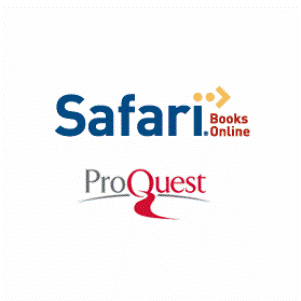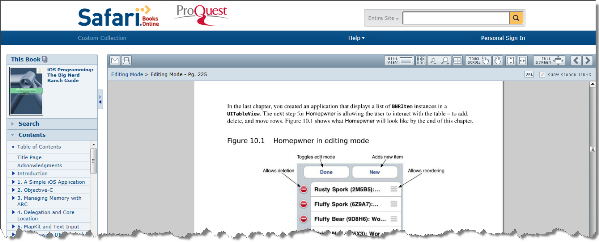
(This article is part of Library Journal’s ongoing series looking at various ebook platforms available to public libraries.)
During a speech at the 2012 Tools of Change Conference earlier this year, Safari Books Online CEO Andrew Savikas spoke about the growing trend of subscription-based services such Netflix for film and TV shows, and Spotify’s streaming music service, and about Safari Books Online’s place in the bookselling environment. Individuals can subscribe to Safari Books Online’s catalog, and many do: Savikas told LJ that its one of its most popular subscription plans for individuals is a flat $42.99 per month for unlimited access to the entire library. But organizations can also subscribe for use by multiple users, and Safari occupies a particularly intriguing place in the library space.
Begun back in 2001 by O’Reilly Media and Pearson Education, the digital library service was something of a pioneer. It now contains some 25,000 ebook and video titles from more than 75 publishers, with new publishers added regularly. Its main strength is its specificity: rather than try to cover every possible subject, Safari Books Online concentrates largely on technology, business, and especially programming, on a subscription basis.
“The biggest part of our value to libraries and their patrons is the quality of our collection of content,” Savikas tells LJ. “When it comes to technology topics in particular, we’ve got all of the best titles. When O’Reilly and Pearson came together more than a decade ago to launch Safari Books Online, they recognized that customers like libraries wouldn’t want to go to every individual publisher to assemble a digital collection.”
It provides exclusive subscription-based access to titles from an array of technology publishers in high demand from programmers and tech enthusiasts, including O’Reilly Media, Prentice Hall, Addison-Wesley, Peachpit Press, Adobe Press, and Adobe Developer Library, New Riders, Cisco Press, Que, Sams, Pogue Press, FT Press, and Wharton. Nonexclusive publishers include John Wiley & Sons, Microsoft Press, McGraw-Hill, IBM, Oracle Press, Apress, Manning, Course Technology Charles River Media, Syngress, and others. The Safari videos collection offer training and instruction in a wide range of programming languages and software from experts in those fields. While many of these books and videos are expensive to buy and, particularly in the case of programming books, can quickly go out of date, Safari, as Savikas points out, allows libraries to “expand their offerings far beyond what they might be able to afford if they purchased each title individually.”
Some 800 libraries, including public, academic, and government libraries, subscribe to Safari Books Online via ProQuest, Safari’s partner in the library market. ProQuest representative Beth Dempsey called the content “indispensable,” and characterized it as “Safari’s niche in ProQuest—providing access to unique and highly sought high-tech content.” She says that about 80 percent of libraries using Safari Book Online via ProQuest are academic, primarily at institutions with a high technology focus, and 10 percent public. Safari’s public library collections, she says, provide access to “a wide variety of personal and professional development titles,” including titles on introductory programming. (ProQuest, of course, is no stranger to the library ebook market. The company bought leading ebook provider ebrary in January 2011, ahead of that year’s American Library Association Midwinter Meeting.)
 More than 90 percent of libraries that carry Safari renew their subscription each year, and they often expand their selections at that point, according to Savikas. Pricing is based on factors including number of concurrent usages and the amount of Safari Books Online content the library offers. Administrative tools are also included to quantify how the content is actually being used. Savikas says that libraries are usually up-and-running just days after signing on via ProQuest, though some implementations can take up to a few weeks.
More than 90 percent of libraries that carry Safari renew their subscription each year, and they often expand their selections at that point, according to Savikas. Pricing is based on factors including number of concurrent usages and the amount of Safari Books Online content the library offers. Administrative tools are also included to quantify how the content is actually being used. Savikas says that libraries are usually up-and-running just days after signing on via ProQuest, though some implementations can take up to a few weeks.
Safari Books Online has also created collections aimed specifically at the needs of public libraries. Savikas describes three pre-selected collections that are available:
- The Beginning Programming Library, which covers programming languages such as Java, C#, and Ruby; the Microsoft-developed Web application framework ASP.NET; the Web application database MySQL, as well as works on Web development, gaming, and other subjects.
- The Consumer Technology Library, which focuses on Microsoft Office products, digital photography, social media, PC maintenance, and mobile technology, among other topics.
- The Personal and Professional Development Library, focusing on business skills, leadership, entrepreneurship, communications, finance, career development, and other subjects.
New features are also upcoming. There’s “some really exciting stuff in the works,” Savikas says—as Safari Books Online migrates to the EPUB ebook format. Though Savikas declined to go into detail about the upcoming features, he did hint that it will likely involve the company’s January acquisition of Threepress and its browser-based reader for EPUB ebooks. Threepress is the company behind the Ibis Reader for computers, netbooks, smartphones, and tablets. (This past July, Safari unveiled its new Safari To Go apps for Apple and Android devices.)
Dempsey says that ProQuest plans to release mobile access tools and personalization features for academic users in the first half of 2013.
GOING PUBLIC
Public libraries provide an interesting look at how Safari is used on a day-to-day basis by patrons. The Independence, MO-based Mid-Continent Public Library has used Safari Books Online since at least 2005, says Information & Reader Services Manager Amy Fisher. The system spends about $60,000 per year on Safari’s technology and business titles, she says, as such titles are some of the most expensive for the library to purchase at full price. “[O]ne nice thing that Safari does is keeping the titles current and deleting older copyright titles,” she notes, which mitigates the costs that would normally be associated with regularly purchasing new and updated editions outright.
She says that 2,116 uses of the technology titles and 95 uses of the business titles were recorded last year, and she notes that some patrons appreciate the access to the expensive tech books in particular. “Once our customers discover that we have it, they love having the access all the time without having to buy, especially, the Microsoft books for themselves,” she tells LJ.
Betty Morganstern, the information services librarian at the larger Annapolis, MD-based Anne Arundel County Public Library, says that the system began using Safari Books Online around 2006, and that the decision to use it was based on a number of different factors. One major advantage: the preselection of the most current and up-to-date technology titles—a difficult proposition for all but the most technology-oriented librarians.
“Determining what technology books to buy is difficult—it’s a rapidly changing field,” she says. “To be able to predict what will be in demand is not for those who aren’t tech savvy.” Safari provided a relatively easy solution to this problem, as “books are added as they’re published from the top technology book publishers.” Just as Mid-Continent’s Fisher noted, Morganstern also highlighted how the editions of individual works were kept relevant and updated. She also pointed out the easy-to-search interface, which reliably returns relevant works.
Morganstern called the service “[g]ood for both technology professionals and lay people.” She said that the library averages about 1,300 Safari sessions last month, and that “[p]atrons love it,” pointing out how a recent Facebook post on the service generated several positive comments from patrons, with one patron learning how to create a website from scratch, solely using Safari texts. It seems likely that that patron will use more programming texts or instructional videos in the Safari library to advance to the next level.


